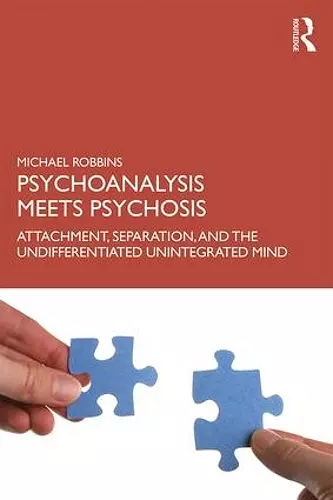Psychoanalysis Meets Psychosis
Attachment, Separation, and the Undifferentiated Unintegrated Mind
Format:Paperback
Publisher:Taylor & Francis Ltd
Published:15th Apr '19
Currently unavailable, and unfortunately no date known when it will be back
This paperback is available in another edition too:
- Hardback£125.00(9780367191153)

Psychoanalysis Meets Psychosis proposes a major revision of the psychoanalytic theory of the most severe mental illnesses including schizophrenia. Freud believed that psychosis is the consequence of a biologically determined inability to attain and sustain a normal or neurotic mental organization. Michael Robbins proposes instead that psychosis is the outcome of a different developmental pathway. Conscious mind functions in two qualitatively different ways, primordial conscious mentation and reflective representational thought, and psychosis is the result of persistence of a primordial mental process, which is adaptive in infancy, in later situations in which it is neither appropriate nor adaptive.
In Part I Robbins describes how the medical model of psychosis underlies the current approach of both psychiatry and psychoanalysis, despite the fact that neuroscience has failed to confirm the model’s basic organic assumption. In Part II Robbins examines two of Freud’s models of psychosis that are based on the assumption of a constitutional inability to develop a normal or neurotic mind. The theories of succeeding generations of analysts have for the most part reiterated the biases of Freud’s two models, so that psychoanalysis considers the psychoses beyond its scope. In Part III Robbins proposes that the psychoses are the result of disturbances in the attachment-separation phase of development, leading to maladaptive persistence of a primordial form of mental activity related to Freud’s primary process. Finally, in Part IV Robbins describes a psychoanalytic approach to treatment based on his model. The book is richly illustrated with material from Robbins’ clinical practice.
Psychoanalysis Meets Psychosis has the potential to undo centuries of alienation between society and psychotic persons. The book offers an understanding of severe mental illness that will be novel and inspiring not only to psychoanalysts but to all mental health professionals.
"Robbins’ goal is to introduce psychoanalysis to psychosis in a way that is internal to psychoanalysis and at the same time independent of the neurosis model and the biases that attend it. He does so successfully in this carefully reasoned and clinically illustrated book, as he returns us to a theory of primitive mind and primary process that Freud himself intimated but never further developed. In so doing, Robbins joins the increasingly interesting minority of analysts who are trying to extend psychoanalytic theory to include the understanding and treatment of psychoses.
For Robbins, psychosis is the consequence of a developmental pathway separate and independent from that of neurosis. It begins with problems of attachment and separation that produce early failures to separate self from object and integrate a cohesive sense of self. These failures leave one incapable of experiencing, sustaining and resolving intrapsychic conflict and lead "to inappropriate and maladaptive persistence of primordial conscious mentation in contexts where reflective representational thought would be appropriate and adaptive."-Howard B. Levine, MD, Editor-in-Chief, The Routledge Wilfred R. Bion Studies Book Series
'Robbins’ goal is to introduce psychoanalysis to psychosis in a way that is internal to psychoanalysis and at the same time independent of the neurosis model and the biases that attend it. He does so successfully in this carefully reasoned and clinically illustrated book, as he returns us to a theory of primitive mind and primary process that Freud himself intimated but never further developed. In so doing, Robbins joins the increasingly interesting minority of analysts who are trying to extend psychoanalytic theory to include the understanding and treatment of psychoses.
For Robbins, psychosis is the consequence of a developmental pathway separate and independent from that of neurosis. It begins with problems of attachment and separation that produce early failures to separate self from object and integrate a cohesive sense of self. These failures leave one incapable of experiencing, sustaining and resolving intrapsychic conflict and lead "to inappropriate and maladaptive persistence of primordial conscious mentation in contexts where reflective representational thought would be appropriate and adaptive.'
Howard B. Levine, MD,editor-in-chief, The Routledge Wilfred R. Bion Studies Book Series
'Psychoanalysis meets Psychosis is a book of great courage and extraordinary depth written by one of the great masters of contemporary psychoanalysis. It represents an important challenge to reductionist biological psychiatry, and to a psychoanalysis entrenched in conservative positions and apathetically limited to the treatment of neurotic patients. It will prove to be of particular importance for new generations that are evermore engaged in the treatment of almost impossible patients: patients that the bureaucracy of training institutes would consider untreatable and extraneous to psychoanalytic expertise. Every seasoned analyst and worker in the field of mental health has much to learn from the horizons opened by this volume.'
Riccardo Lombardiis a psychoanalyst, psychiatrist and doctor of medicine. To read this review in full, please see the following: Lombardi, R. (2023) Psychoanalysis Meets Psychosis. Attachment, Separation, and the Undifferentiated Mind, by Michael Robbins, 2019, New York, London, Routledge, Pp. 206., 34,99£, ISBN 9780367191177. International Journal of Psychoanalysis 104:793-796.
ISBN: 9780367191177
Dimensions: unknown
Weight: 380g
196 pages